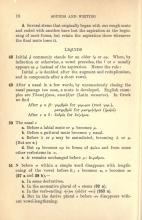48. Initial ῥ commonly stands for an older ϝρ or σρ. When, by inflection or otherwise, a vowel precedes, the ϝ or σ usually appears as ρ instead of the aspiration. Hence the rule:
Initial ρ is doubled after the augment and reduplication, and in compounds after a short vowel.
49. After a nasal in a few words, by unconsciously closing the nasal passage too soon, a mute is developed. English examples are Thom(p)son, num(b)er [Latin numerus].
After μ a β:
γαμβρός for γαμ-ρος (root γαμ-)
μεσημβρίᾱ for μεσημ(ε)ριᾱ (ἡμέρᾱ)
After ν a δ:
ἀνδρός for ἀν(ε)ρος.
a. Before a labial mute or μ becomes μ.
b. Before a guttural mute becomes γ nasal.
c. Before λ or ρ may be assimilated, becoming λ or ρ. (But see e)
d. But νμ becomes σμ in forms of φαίνω and from some other verb stems in -ν.
e. ἐν remains unchanged before ρ.
ἔν-ρυθμος
51. ν before σ within a simple word disappears with lengthening of the vowel before it; ε becomes ει, o becomes oυ (§§ 27.a and 28.b):
a. in some derivatives;
b. in the accusative plural of ο-stems (§ 62.a);
c. in the verb-ending -(ν)σι (older -ντι) (§ 263.a);
d. but in the dative plural -ν- before -σι disappears without vowel lengthening.
a. changes ν to σ before a simple σ;
b. loses ν before σ followed by a consonant, and before ζ.
53. The group ντ, νδ, or νθ before σ disappears, with lengthening of the vowel before it (§ 28.b).

